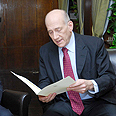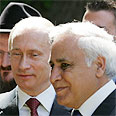
Resigning prime minister
Photo: Avi Ohayon, GPO

Removed president
Photo: Reuters

Candidacy hopeful
Photo: Alex Kolomoysky

Metzger off the hook
Photo: AFP

Becker says nation wants honest leaders
Photo: Motti Hakshur
On the eve of the Chief Rabbinate's Rabbinical Council elections, Attorney General Menachem Mazuz told the government he would not pursue a criminal case against Chief Ashkenazi Rabbi Yona Metzger.
The statement was made in response to a demand by the Ometz Association (which champions proper public administration) to file charges against Metzger for allegedly receiving illicit benefits in return for marrying couples deemed disqualified to marry under Jewish Law; "making inappropriate sexual advances" at a photographer and having various private groups fund trips abroad for him and his family.
Case Dropped
Aviad Glickman
Senior aide to attorney general says State Prosecutor's Office found no evidence to support pursuing criminal case against chief rabbi
Before Tuesday’s elections which determined how the Rabbinate views its goals for the upcoming years, a conjoined Ynet and Gesher Organization survey was conducted on what crimes the public views as sufficient grounds for removing a rabbi from his position.
The conclusion: An acting rabbi must also be dismissed for “moral” transgressions that are not crime-related
Moreover, as a byproduct of the upcoming days of forgiveness, the public is ready to forgive the mistakes made by opposition leader MK Benjamin Netanyahu (Likud) and former Shas Chairman Aryeh Deri but not of those made by former President Moshe Katsav.
The Gesher-Ynet survey was conducted by the Panel4All institute which included 510 participants who serve as a statistical sample of the Jewish, adult population in Israel.
Innocent until proven guilty
In the first part of the questionnaire participants were asked, “What types of misdeeds are grounds for removing a rabbi holding a public position (city rabbi, head rabbi, etc.)?”Forty-three percent said that a rabbi must also be dismissed for “moral” transgressions that are not criminal.
Thirty-one percent believe that just like any other person, a rabbi also has the right to prove his innocence and thus he should be able to continue in the position as long as he is not proven guilty.
Twenty-six percent said that rabbis must be treated just like any other public figure and their dismissal should occur only upon an indictment proposal for criminal acts.
A religious categorization showed that secular and traditional participants are actually “stricter” with rabbis and are of the opinion that they should be ousted for moral transgressions (47% and 44% respectively).
However, the ultra-Orthodox and religious people asked believe that a rabbi is innocent until proven guilty for crime-related acts alone and until then should be able to maintain his position (79% and 51% respectively).
Netanyahu, Deri or no one?
The second question in the survey was, “Which of the following leaders are you willing to forgive despite their past faults?”The participants were presented with six names. Twenty-four percent chose former Prime Minister and Opposition leader MK Benjamin Netanyahu (Likud) and 17% chose the mythological former Shas Chairman Aryeh Deri.
Thirteen percent granted their forgiveness to Labor Chairman and Defense Minister Ehud Barak and 12% said Former IDF Chief of Staff Lt.-Gen. Dan Halutz.
Resigning Prime Minister Ehud Olmert received 9% while solely 4% were given to former President Moshe Katsav.
However, 36% of those asked said they won’t forgive any one of the mentioned personas.
An assessment of the outcome shows that 74% of the ultra-Orthodox respondents preferred forgiving Aryeh Deri and then Netanyahu with 37% but none of them would forgive Olmert.
Amongst the religious, Netanyahu received 43% forgiveness points and Deri came in at a close second with 40%.
The traditional representation was also more sympathetic with Netanyahu with 30% and Deri with 20%.
The secular population asked chose Netanyahu first with 19% and Deri was second last with 10%; just one step up from Katsav.
All in all, 11% of the haredis and 21% of the religious said that they wouldn’t forgive any of the people mentioned. This is in comparison with 35% of the traditional and 39% of the secular public who were even less sympathetic.
Gesher Director Shoshi Becker said that “it is interesting that actually people who don’t consider themselves religious hold rabbis to a much higher moral standard and the outcomes of the survey can be explained in two completely opposite ways.
Those who don’t consider the importance of the rabbinic world or tend to criticize it will find a way to charge a rabbi and distance him from influencing Israeli society or in actuality, people who are not religious but appreciate tradition and Judaism would want a rabbi to be a positive and moral representative of tradition and Judaism.”
Becker went on to say, “While we are in the month of forgiveness and mercy, the nation of Israel is not quick to forgive its leaders. The survey proves that the expectation of rabbis is higher than that of political leaders.
"The message to political leaders and rabbis is clear, the nation wants a moral, straight and honest leadership and is not quick to give second chances,” she said.
A 4.4% sampling error may exist















